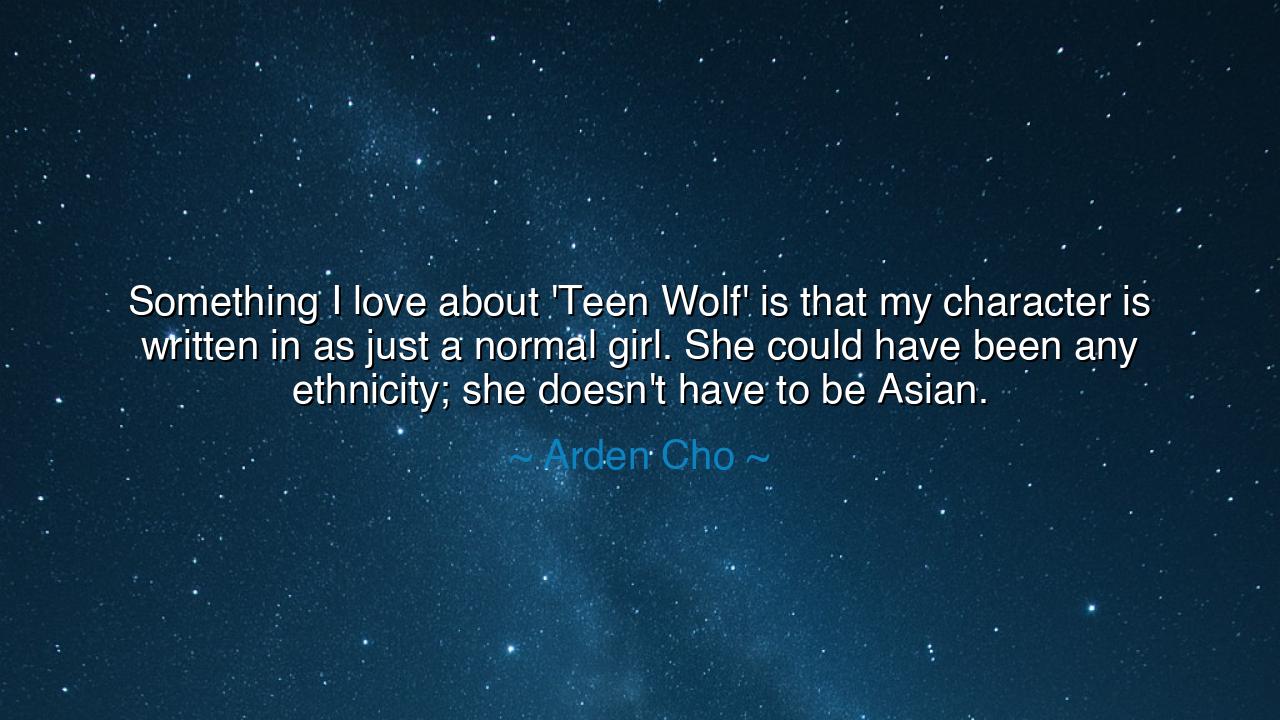
Something I love about 'Teen Wolf' is that my character is
Something I love about 'Teen Wolf' is that my character is written in as just a normal girl. She could have been any ethnicity; she doesn't have to be Asian.






When Arden Cho proclaimed, “Something I love about ‘Teen Wolf’ is that my character is written in as just a normal girl. She could have been any ethnicity; she doesn’t have to be Asian,” she voiced a triumph not merely of casting, but of dignity. Her words shine with the joy of a barrier lifted, of a role no longer bound by stereotype or narrow expectation. To be seen first as human, and not reduced to heritage alone, is a victory for the spirit—an affirmation that stories can reflect truth without chains.
The meaning of her reflection rests in the struggle of representation. For too long, characters of many ethnicities were not written as normal, but as caricatures, forced to carry the weight of stereotype. They were defined by their difference rather than their humanity. In Cho’s words we hear the relief of breaking that cycle—the recognition that she could embody her role not as a token, not as an emblem, but simply as a girl with depth, dreams, and flaws. This is the profound gift of inclusivity: it reminds us that the essence of being human transcends the labels of race.
The origin of this moment lies in the evolution of storytelling. As media and culture grew more conscious, writers began to understand that the truest strength of diversity is not in exoticizing difference, but in normalizing it. In ‘Teen Wolf’, Cho’s role became a testament to this change. It symbolized that an Asian actress need not only portray the foreigner, the genius, or the mystic, but could step into the role of “the girl next door.” This is a quiet revolution, but one as powerful as any battle fought on open fields.
History provides us with echoes of this struggle. Recall the days when African American performers in early American cinema were only permitted to play servants or caricatures, until artists like Sidney Poitier shattered those boundaries, showing the world that dignity, strength, and subtlety were not the possession of one race alone. In the same way, Arden Cho’s words remind us that progress is not only in the grand gestures but in the small, everyday portrayals that allow marginalized voices to simply exist without explanation or stereotype.
Her quote also teaches us about the human hunger to be seen as more than categories. To be described as “just a normal girl” is not to deny identity, but to affirm equality. For true representation does not come when difference is erased, nor when it is exaggerated, but when it is allowed to exist naturally, woven seamlessly into the human fabric of story. Cho’s joy comes from knowing that her character was not bound by her background, but free to live as fully human—something that all people deserve, but not all have been given.
The lesson here is one of liberation: see others first as human, before labels. Ethnicity, culture, and tradition enrich the soul, but they should not be cages that limit what one can be. When we look at one another, we must look deeper than appearance or heritage and see the individual soul standing before us. For in that recognition, we grant the dignity that every human being longs for—the right to be seen as whole.
Practical wisdom flows from this. If you are a storyteller, write characters whose humanity comes first, whose depth is not overshadowed by stereotype. If you are a leader or teacher, resist the urge to define others only by what is visible—listen to their stories, their hearts, their unique voice. And if you are one who has felt reduced to a label, take Cho’s words as encouragement: you are more than any category, more than any box the world tries to place upon you.
Thus Arden Cho’s words rise beyond the realm of television. They become a teaching for generations: that equality is not merely in being included, but in being allowed to be ordinary, to be complex, to be real. When a character can be played by anyone—of any ethnicity—then at last we have taken a step toward truth. And in that truth lies the hope that one day, all people may stand on the stage of life not as stereotypes, but as full, radiant human beings.






AAdministratorAdministrator
Welcome, honored guests. Please leave a comment, we will respond soon